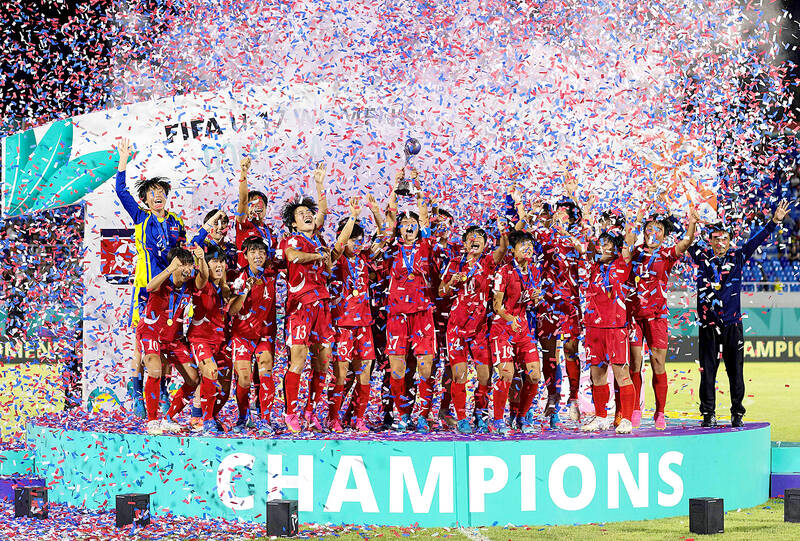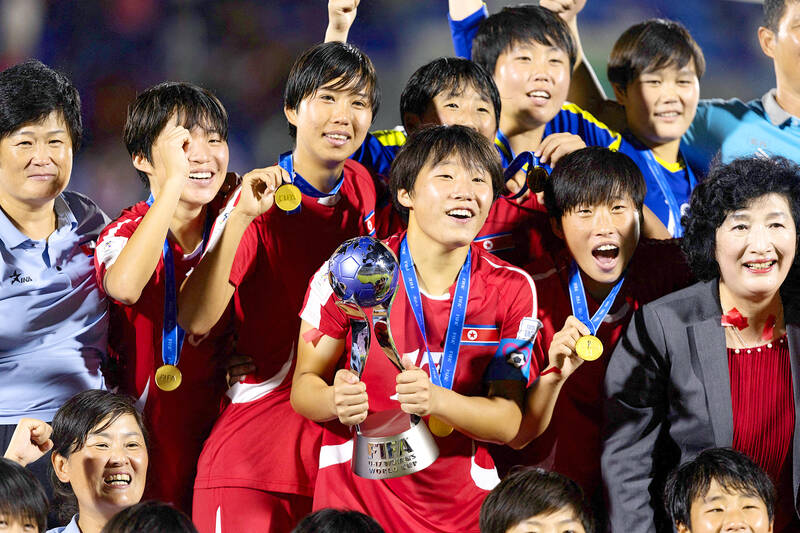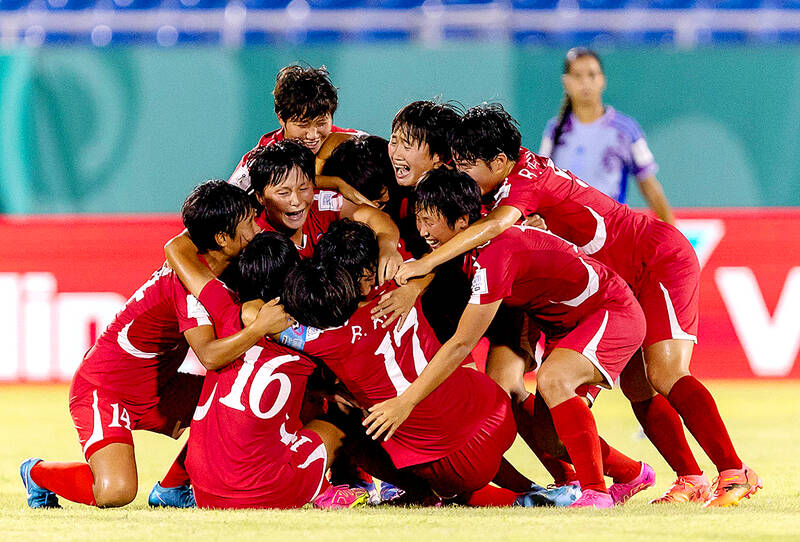Talent, discipline and a desire to please leader Kim Jong-un have helped propel North Korea’s youth footballers to two Women’s World Cup crowns in a matter of weeks, experts say.
Nuclear-armed but impoverished, North Korea is more often in the news for sanctions-busting ballistic missile launches.
But after winning the under-17 Women’s World Cup on Sunday, state media proclaimed that the country’s teenage players were “the attention of football experts, fans and spectators across the world.”

Photo: AFP
The U17 triumph came after North Korea — largely closed off to the outside world — also lifted the Women’s World Cup at under-20 level in September.
“I want to first share this joyous news with our beloved father and leader Kim Jong-un,” under-17 goalkeeper Park Ju-gyong said. “I am so happy and overwhelmed that I can’t help but cry.”
Giving thanks to the Kim family is a tradition for North Korean athletes after notable victories.

Photo: AFP
Lee Sang-yoon, a former player for the South Korean men’s team, said that North Korea’s women footballers are “very skillful and known for their stamina.”
He said that the “political system” also comes into it — in that “they strictly adhere to predetermined play patterns in terms of formation and tactics.”
Irune Dorado, part of the Spain under-17 team beaten on penalties in the final, called the North Koreans “a very intense team.”

Photo: AFP
“They don’t let you breathe,” she told the FIFA Web site.
WHY WOMEN?
Across the board, North Korean women appear to outperform men at sport.
At the Hangzhou Asian Games last year, out of a total of 11 gold medals, 10 were won by women athletes.
When the government picks North Korea’s top 10 athletes of the year, it is often mostly women.
“While North Korean society is extremely patriarchal in many ways, the state is more than willing to elevate female athletes to the same — and in some cases higher — level as their male counterparts,” said Shreyas Reddy, a North Korean analyst at the Web site NK News.
The logic behind it is simple.
“It represents a greater chance of success,” he said.
North Korea’s men have been to the World Cup twice, famously reaching the quarter-finals in England in 1966. They are currently ranked 111 in the world.
Their female counterparts have been to the Women’s World Cup four times, getting to the quarter-finals in 2007. They are ranked ninth.
It has changed in recent years, with European nations investing in women’s football, but for decades North Korea seized their chance in the female game when other countries weren’t so interested, experts say.
The two recent World Cup victories were not one-offs.
North Korea have won each tournament a record three times, although that is yet to translate into success when it comes to the biggest prize of all, the Women’s World Cup.
Former Premier League striker Shaun Goater was a member of FIFA’s technical study group at the under-17 tournament and watched every North Korea match.
“They are a really organized, fit, athletic team with a high level of technical ability and game understanding,” he said.
Winger Jon Il Chong walked off with the Golden Ball award for best player at the competition.
Another possible star of the future is countrywoman Choe Il Son. She was named the best player and was top-scorer at the under-20 World Cup.
‘FOOTBALL FAN KIM’
North Korean defector Cho Mi-young says that the state plucks the best budding footballers from primary schools across the country and brings them to the capital Pyongyang.
“As it’s one of the few opportunities for North Korea to gain positive attention in the international community, the country is dedicating significant resources to developing talented athletes,” Cho told Radio Free Asia.
The players undergo years of intense training, but Cho said “the strong mentality and tenacity of North Korean women might have been the biggest factor in their victory.”
“Their genuine belief in the need to please their leader” is another major motivation, said Cho.
Kim is said to have a passion for football and a “Pyongyang International Football School” opened two years into his rule.
Heo Jeong-pil, a professor of North Korean studies at Dongguk University in Seoul, said Kim had lent his “interest and support” to women’s football.
Heo put the teams’ successes down to “their powerful physical conditioning combined with solid resolve.
“This drive is particularly motivated by an intense desire to enhance national prestige, a motivation that is notably stronger compared to other countries.”

The Democratic Progressive Party (DPP), Chinese Nationalist Party (KMT), and the country’s other political groups dare not offend religious groups, says Chen Lih-ming (陳立民), founder of the Taiwan Anti-Religion Alliance (台灣反宗教者聯盟). “It’s the same in other democracies, of course, but because political struggles in Taiwan are extraordinarily fierce, you’ll see candidates visiting several temples each day ahead of elections. That adds impetus to religion here,” says the retired college lecturer. In Japan’s most recent election, the Liberal Democratic Party lost many votes because of its ties to the Unification Church (“the Moonies”). Chen contrasts the progress made by anti-religion movements in

Taiwan doesn’t have a lot of railways, but its network has plenty of history. The government-owned entity that last year became the Taiwan Railway Corp (TRC) has been operating trains since 1891. During the 1895-1945 period of Japanese rule, the colonial government made huge investments in rail infrastructure. The northern port city of Keelung was connected to Kaohsiung in the south. New lines appeared in Pingtung, Yilan and the Hualien-Taitung region. Railway enthusiasts exploring Taiwan will find plenty to amuse themselves. Taipei will soon gain its second rail-themed museum. Elsewhere there’s a number of endearing branch lines and rolling-stock collections, some

Last week the State Department made several small changes to its Web information on Taiwan. First, it removed a statement saying that the US “does not support Taiwan independence.” The current statement now reads: “We oppose any unilateral changes to the status quo from either side. We expect cross-strait differences to be resolved by peaceful means, free from coercion, in a manner acceptable to the people on both sides of the Strait.” In 2022 the administration of Joe Biden also removed that verbiage, but after a month of pressure from the People’s Republic of China (PRC), reinstated it. The American

This was not supposed to be an election year. The local media is billing it as the “2025 great recall era” (2025大罷免時代) or the “2025 great recall wave” (2025大罷免潮), with many now just shortening it to “great recall.” As of this writing the number of campaigns that have submitted the requisite one percent of eligible voters signatures in legislative districts is 51 — 35 targeting Chinese Nationalist Party (KMT) caucus lawmakers and 16 targeting Democratic Progressive Party (DPP) lawmakers. The pan-green side has more as they started earlier. Many recall campaigns are billing themselves as “Winter Bluebirds” after the “Bluebird Action”